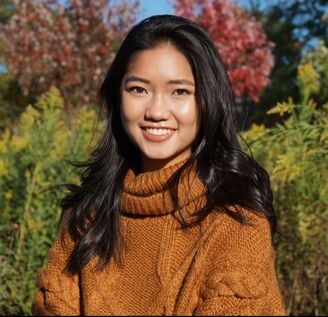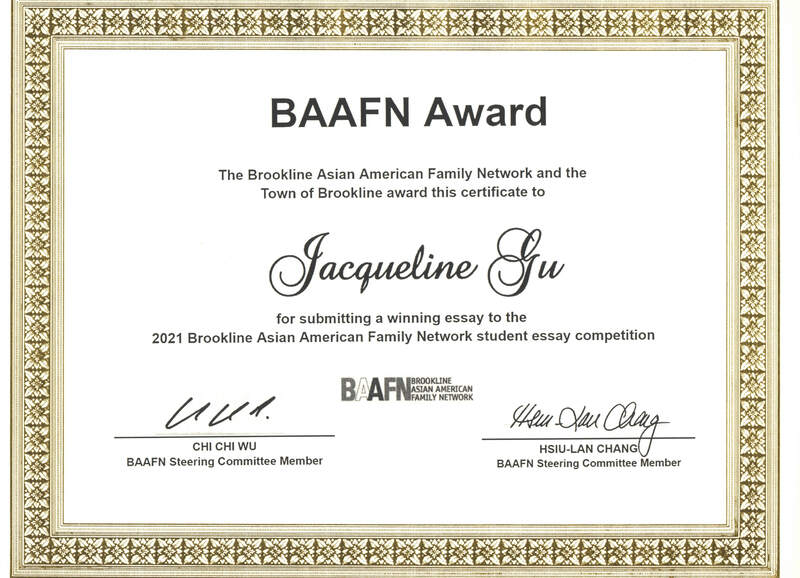2021 BAAFN Award
Water and Ink
by Jacqueline Gu
Guwei stared out of the frosted airplane window, her breath ever so slightly fogging it.
The little carts and airport workers glided silently in the fading dusk. The lights of the city grew
brighter against the darkened night sky and were soon accompanied by stars.
The crinkle of static preceding the pre-flight announcement brought her out of her
reverie.
Ladies and gentlemen, welcome onboard Flight 4B7 with service from Chicago to
Shanghai.
Nushengmen, xiangshengmen, huanying cong zhijiage dao shanghai de 4B7 hangban
deng ji.
“Guwei, if the announcements were only in mandarin, would you be able to understand
them?”
Her father knew the answer. He asked anyway.
She shook her head. No, no she would not.
She was not who she once was.
〜
Tugging her suitcase along, Guwei followed her father through the airport. She took three
steps for every two of his. The air was muggy, and she felt the weight of the air press down on her
head and shoulders. The monotony of the architecture closed in around her, shouting through the
grayness that she was an outsider.
She passed face after face, stranger after stranger. She saw everybody and nobody. They
all looked like her – sometimes she would see a glimmer of her eyes or a shadow of her jaw in
the crowd. But she held no recognition for them, and they held none for her.
She saw a familiar sign amidst the illegible. Her name, Guwei, written with dainty
brushstrokes and in ink black as her hair, more gracefully than she had ever been able to with the
Chinese calligraphy brushes her mother used at home. She recognized the familiar swishes and
crossed lines of the two characters that represented her. She remembered her grandmother’s
gentle touch guiding her through each stroke of her name, when her hands were barely able to fit
themselves around a bamboo brush, and her chin barely rose over the edge of the table that
allowed her to see the rice paper she was imprinting. Staining it, unforgivingly and irreversibly
with herself.
She didn’t recognize the face behind the sign. Her father made loud greetings and shared
hugs while she stood awkwardly to the side.
“Guwei, acknowledge your auntie. The last time she saw you was when you were just a
toddler.”
“Ni hao, ayi,” she mumbled, not knowing why she was calling a woman she did not
recognize and did not know her “aunt,” her “ayi.”
“Do you remember me?” her ayi asked.
She knew the answer. She asked anyway.
No, no she did not.
She was not who she once was.
〜
She was once like them. Back then, she ate lychee fruit for her afternoon snack, and each
time her fingers would shrivel up and turn sticky with nectarine juice. She’d pick fresh
cucumbers from her grandfather’s garden, marvelling at their size and tenderness. She didn’t yet
have American cucumbers to compare them to, with their thick dark skin and hard crispness, but
as she grew older she came to miss her grandfather’s cucumbers. Ripe with labor and love.
She’d play made up games with dried lima beans with her father’s sisters, her true ayis.
She’d paint her cousin’s nails and rouge her cheeks with a three-year-old’s imprecision and
heavy hand. Her grandfather would tell her stories about his childhood in his regional
dialect. A dialect she used to understand and speak.
But, like water in ink, it evaporated.
Inevitably, back to America she would go. Armed only with fluency in mandarin, she
was thrown into a whole new world. A world of “mommy” and “daddy” instead of “mama” and
“baba,” of pancakes instead of red bean juk, of twenty-six letters instead of thousands of artfully
designed characters.
As she assimilated, her dark ink became dilute in the Great American Melting Pot. Just
like that, a year and a half of immersion in Chinese culture evaporated. Like water in ink.
Now, she can barely greet her ayi in her native tongue.
〜
Though ink evaporates, pigment itself cannot so easily disappear. It continues to run
through her hair and eyes, coursing through her blood and every molecule of every cell. Ink has
memory; it leaves a trail of where it has been. It may evaporate, but it will never turn colorless.
Little by little, water rehydrates the dried pigments. As the ink courses through my veins,
I know it will never allow me to forget the strokes of my name or the place I am from.
The little carts and airport workers glided silently in the fading dusk. The lights of the city grew
brighter against the darkened night sky and were soon accompanied by stars.
The crinkle of static preceding the pre-flight announcement brought her out of her
reverie.
Ladies and gentlemen, welcome onboard Flight 4B7 with service from Chicago to
Shanghai.
Nushengmen, xiangshengmen, huanying cong zhijiage dao shanghai de 4B7 hangban
deng ji.
“Guwei, if the announcements were only in mandarin, would you be able to understand
them?”
Her father knew the answer. He asked anyway.
She shook her head. No, no she would not.
She was not who she once was.
〜
Tugging her suitcase along, Guwei followed her father through the airport. She took three
steps for every two of his. The air was muggy, and she felt the weight of the air press down on her
head and shoulders. The monotony of the architecture closed in around her, shouting through the
grayness that she was an outsider.
She passed face after face, stranger after stranger. She saw everybody and nobody. They
all looked like her – sometimes she would see a glimmer of her eyes or a shadow of her jaw in
the crowd. But she held no recognition for them, and they held none for her.
She saw a familiar sign amidst the illegible. Her name, Guwei, written with dainty
brushstrokes and in ink black as her hair, more gracefully than she had ever been able to with the
Chinese calligraphy brushes her mother used at home. She recognized the familiar swishes and
crossed lines of the two characters that represented her. She remembered her grandmother’s
gentle touch guiding her through each stroke of her name, when her hands were barely able to fit
themselves around a bamboo brush, and her chin barely rose over the edge of the table that
allowed her to see the rice paper she was imprinting. Staining it, unforgivingly and irreversibly
with herself.
She didn’t recognize the face behind the sign. Her father made loud greetings and shared
hugs while she stood awkwardly to the side.
“Guwei, acknowledge your auntie. The last time she saw you was when you were just a
toddler.”
“Ni hao, ayi,” she mumbled, not knowing why she was calling a woman she did not
recognize and did not know her “aunt,” her “ayi.”
“Do you remember me?” her ayi asked.
She knew the answer. She asked anyway.
No, no she did not.
She was not who she once was.
〜
She was once like them. Back then, she ate lychee fruit for her afternoon snack, and each
time her fingers would shrivel up and turn sticky with nectarine juice. She’d pick fresh
cucumbers from her grandfather’s garden, marvelling at their size and tenderness. She didn’t yet
have American cucumbers to compare them to, with their thick dark skin and hard crispness, but
as she grew older she came to miss her grandfather’s cucumbers. Ripe with labor and love.
She’d play made up games with dried lima beans with her father’s sisters, her true ayis.
She’d paint her cousin’s nails and rouge her cheeks with a three-year-old’s imprecision and
heavy hand. Her grandfather would tell her stories about his childhood in his regional
dialect. A dialect she used to understand and speak.
But, like water in ink, it evaporated.
Inevitably, back to America she would go. Armed only with fluency in mandarin, she
was thrown into a whole new world. A world of “mommy” and “daddy” instead of “mama” and
“baba,” of pancakes instead of red bean juk, of twenty-six letters instead of thousands of artfully
designed characters.
As she assimilated, her dark ink became dilute in the Great American Melting Pot. Just
like that, a year and a half of immersion in Chinese culture evaporated. Like water in ink.
Now, she can barely greet her ayi in her native tongue.
〜
Though ink evaporates, pigment itself cannot so easily disappear. It continues to run
through her hair and eyes, coursing through her blood and every molecule of every cell. Ink has
memory; it leaves a trail of where it has been. It may evaporate, but it will never turn colorless.
Little by little, water rehydrates the dried pigments. As the ink courses through my veins,
I know it will never allow me to forget the strokes of my name or the place I am from.



